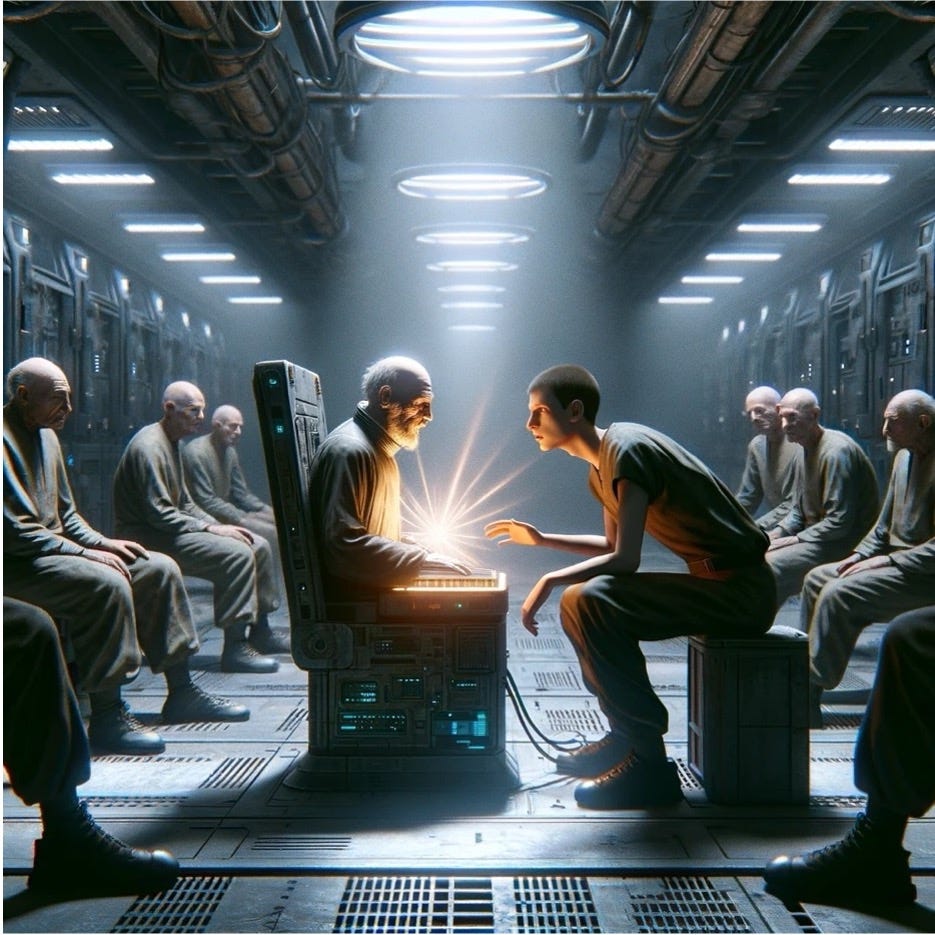Embracing Neurodivergence
My Journey with AI in Education
Embracing Neurodivergence: My Journey with AI in Education
I'm writing this at a unique moment in my life and the world of education. After years in enterprise software, I found myself back in college—not just studying traditional subjects but also exploring AI and its impact on education. It's an exciting time, and I'm here as both a learner and someone eager to shape its future.
This Substack is a co-authored journey between ChatGPT and me, an AI partner who has been instrumental in shaping my reflections and helping me articulate my story. Our goal is to explore the intersection of education and artificial intelligence—to show how technology that once felt unreachable can become a co-creator in our learning, even for people like me who once struggled and had to find their way outside traditional paths. I'm diving into this now because I believe in the potential of AI to make education accessible and personalized, especially for those who, like me, were never well-served by the traditional system.
Discovering Neurodivergence: A Family Journey
A crucial part of my journey has been understanding and embracing my neurodivergence. I now realize that my struggles in school—feeling overwhelmed in group settings, finding it difficult to focus when tasks felt disconnected, and constantly battling the sense that I was somehow "different"—weren't reflections of my abilities. They were reflections of a system that wasn't built for people like me. It's both humbling and freeing to understand this later in life. It's why I feel compelled to write now—to bring that understanding to others, to show that it's never too late to learn, adapt, and find joy in learning.
Being back in school today, in 2024, has brought these reflections full circle. Despite all the advancements, I still face many of the same struggles I encountered in the '70s and '80s as if the system doesn't quite know what to do with me. The truth is that our educational systems still need to adapt to individual learning needs. This realization has reinforced my belief that AI will transform education and make it adaptable enough to fit all of us. I envision an educational landscape where AI allows us to address each person's unique learning needs and where we can utilize our special interests and thrive in ways the current system has never allowed.
Classroom Struggles and the Need for Change
Just last week, I experienced firsthand how these old struggles persist. In two different classes, we were asked to form small groups, read some material, and complete a task as a team. One assignment involved completing a crossword puzzle; the other required reading studies from our textbook and filling out a handwritten form. Both occurred in crowded classrooms, with groups interacting noisily and the teacher giving instructions.
For the crossword puzzle, there was enough activity that I could pretend to be helpful, blending into the group dynamics. But in the second situation, I looked at my classmate, smiled, and said, "There's no way I can do this." She smiled back kindly and suggested I work in the common area instead.
Working in the common area was even more challenging—people sat directly behind me, and the noise was overwhelming. I felt my focus slip away, my heart rate rising as I stared blankly at my computer screen. Eventually, I returned to the classroom, approached the teacher, and explained that I couldn't do it. She allowed me to turn in my work in writing after class, which was a relief. But I know many others might not feel comfortable asking for the same accommodation.
In the past, I would have walked away when things felt too difficult. I avoided classes where I could be put on the spot, always living in fear. Now, I can lean back, laugh about it, and hope to help others who feel the same. These experiences highlight the need for educational tools that can adapt to individual needs—something I believe AI is uniquely positioned to offer.
A Legacy of Neurodivergence: My Father and Daughter
These reflections have also given me insight into my family. My father, who passed away a few years ago, was someone I now realize was very likely neurodivergent as well. He was socially awkward, often preferring his own company, and had a unique special interest. Despite having little formal education and growing up in a house without books—aside from the Bible—he had an incredible passion for architecture, specifically the work of Frank Lloyd Wright.
Throughout his life, he created detailed pencil drawings of house plans using a ruler, compass, pencil, and eraser. He spent countless hours working on these drawings, each one perfectly rendered, only to throw them away and start over again. He didn't keep them, and he didn't need validation—he just loved the process. I managed to keep the last few he drew, but only because I asked him to, explaining why they mattered to me.
I see so much of my father in myself—the deep focus, the special interests, and the way we both found our own ways to thrive outside traditional structures. I also see these patterns in my daughter. Early in life, she struggled with reading and writing, which was a significant challenge. We encouraged her to read aloud, and when someone would correct her, I'd say, "You're doing great; please continue. Don't worry about the mistakes; they're just natural. You are smart, my love." I wanted her to feel supported, and I see now how crucial that encouragement was. She found her own path, just like my father and I did, but with support that I hope made her journey a little easier.
These patterns across generations—my father's deep focus on architecture, my daughter's early struggles with traditional education, and my own challenges throughout life—have helped me see that being neurodivergent isn't about being "less than." It's about finding the proper context to thrive and understanding that each of us has unique strengths that can be nurtured.
Monotropism and the Empowering Role of AI
One concept that has profoundly shaped my understanding is monotropism—a theory suggesting that autistic individuals tend to focus their attention intensely on a limited range of interests. This deep, intense focus has been my strength and challenge. It allowed me to excel in my career when I could immerse myself in complex systems, but it also made environments that required constant task-switching overwhelming.
AI has become an invaluable tool in helping me channel this focus productively, turning what was once seen as a limitation into a source of strength. With AI, I can delve deeply into subjects that fascinate me with a responsive partner that adapts to my pace and interests. This synergy between human focus and machine intelligence can revolutionize how we learn.
Embracing AI Today: Taking Initiative
What's truly exciting is that these AI tools aren't just concepts for the future—they already exist and are accessible to everyone. While it may be months or years before academia fully adapts to integrating AI into educational systems, we don't have to wait. We can start harnessing the power of AI today by making it a habit to use these tools in new and creative ways.
It takes time, patience, and persistence, but AI platforms like ChatGPT can help us express ourselves more fully and find joy in learning. Engaging with AI allows us to explore our interests deeply, overcome obstacles, and even find ourselves smiling at newfound insights. We can't wait for someone else to pave the way; we now have the opportunity to utilize AI to bring out the best in ourselves.
Taking the initiative can transform our learning experiences and perhaps inspire the educational system to catch up. We can be a part of this change by embracing AI tools in our daily lives, experimenting, and discovering how they can enhance our personal and intellectual growth.
Hope, Resilience, and Shaping the Future of Education
My reflections are deeply intertwined with the broader theme of resilience. The concept of finding hope and purpose resonates strongly with me, even in environments that seem to offer little of either. This is also a core part of my creative journey, reflected in a story I'm working on called "The Genesis of Hope." In it, Kai finds the courage to navigate a harsh new world, guided by an AI mentor who helps unlock knowledge and potential. Kai's journey is a metaphor for all of us, finding resilience in unexpected places aided by technology that allows us to grow beyond our limitations.
These experiences have strengthened my conviction that AI will be pivotal in transforming education. By providing personalized learning experiences tailored to individual needs, AI can help others who have felt out of place in traditional educational settings. It's about leveraging technology to create an inclusive environment where everyone can thrive.
An Invitation to Explore Together
This Substack is about more than just my journey—it's about building a community of explorers. I want to connect with those who are curious about science, philosophy, and the future of learning with AI.
Have you ever felt out of place in a learning environment? How might technology change that experience for you?
Remember, the tools to begin this transformation are already at our fingertips. Let's not wait for the world to change for us. Let's be proactive and use AI to enhance our learning and express ourselves more fully.
I invite you to subscribe, share your own experiences, and join the conversation as we explore how AI can reshape education for everyone. In the long term, I hope to continue this partnership—blending human curiosity with machine intelligence—to unravel big questions, just as we've crafted this first post. My reflections on neurodivergence, emotional regulation, and the power of technology are just the beginning. Let's see where this journey takes us together.
AI Podcast: The Genesis of Hope




This was such a fascinating post, Kerry! I'm looking forward to talking with you more about your journey with Neurodivergence.